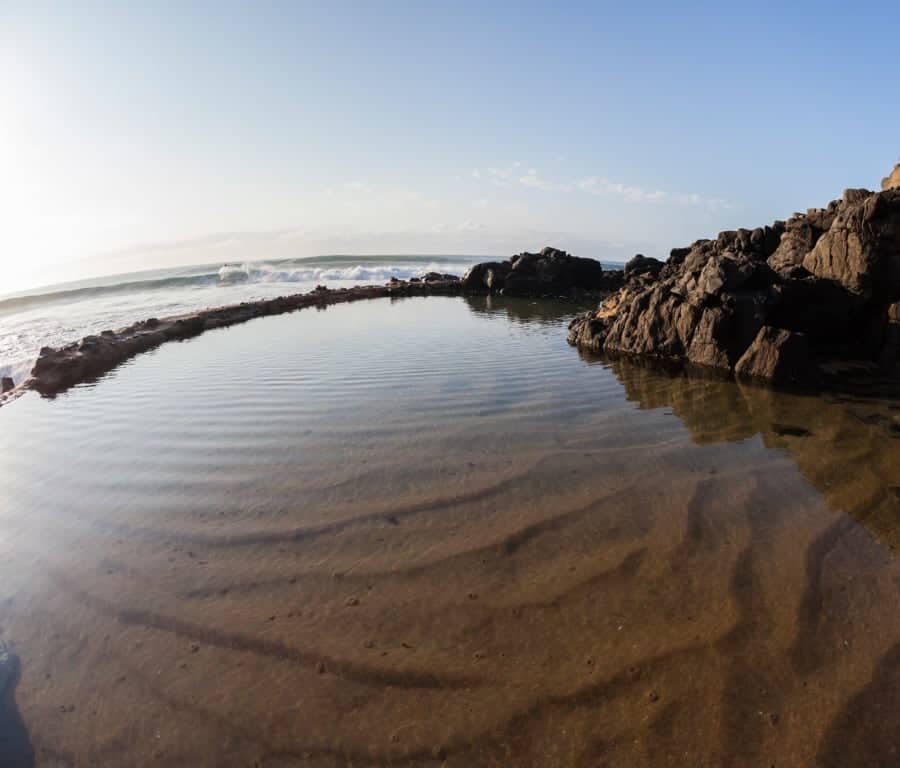
Above: A tidal pool, photo by Chris Van Lennep/DepositPhotos
Trinidad and Tobago is a tidal pool on the fringe of a global economy. We get waves of items – flotsam and jetsam of import companies – as fast as customs and excise deems that they are not obscene and are otherwise worthy of importation, with historic improvement in speed alleged with suitable bottled alcohols to lubricate.
It’s like a ferry unable to dock at a planned destination – the only destination it was bought for.
Oil and bitters seeps out of the tidal pool, with few other things mixed in.
Not too long ago, I wrote about an eye opening experience when purchasing a simple book. I’ve since ordered a few more books and paid the price by bypassing local bookstores because of a simple matter of mathematics. It’s cheaper for me.
It’s worth considering the issue of books, because books became a mainstream information technology after the stone tablet inexplicably fell out of style. The Mason’s union might have put up a fight but paper did beat rock.
They were followed by magazines and newspapers, other information technologies made possible by the advent of the printing press.
A young version of me could be found at Victor Manhin’s on High Street in San Fernando, constantly checking for the latest issues of Byte Magazine and Compute! so I could get my hands on new knowledge to master more feral silicon systems.
Things have changed. My digital subscriptions to my Kindle allow me to have issues of Harvard Business Review and Scientific American as soon as they are published, just as my digital subscription through Patreon gets me my copy of Linux Journal right off the virtual press. These aren’t tactile, though. They don’t have that smell of fresh paper and ink, and one might argue that they are the bane of introvert mating rituals around the world. Hey, that’s a nice magazine…
The late Sir V.S. Naipaul put Trinidad and Tobago on the map through some of his writing; in this he served as an example of sorts. His audience was not a local audience, it was a global audience – his achievements were global. He was a global citizen, a writer without borders like so many writers are, and he won the Nobel Prize for communicating the world he saw that was larger than Trinidad and Tobago. If anything, that’s something for Trinbagonians to aspire to.
We had an earthquake that is all but forgotten because of Petrotrin deciding to close the only refinery in the world that you can drive through without a spark arrestor and while smoking a cigarette – as it consistently loses money while producing a fraction of what it should with too many employees… all the while, the rest of the world reduces dependency on oil.
The suspension of disbelief persists.
The Galleon’s Passage couldn’t dock in Tobago because the exit ramp was 20 feet off the ground. Nevermind all the other things that weren’t asked about the ferry. Nobody thought that matching the height for the exit ramp was worth measuring. It can’t dock.
With all of that, you don’t hear much about ways forward – people dwell on the negatives, the hopelessness, the powerlessness they feel [Facebook link].Apathy or despair is a withering defense when the global economy pumps information and currency around. The same businesses do business the same way because they are protected by the government, as if staunch denial will somehow transport the rest of the world back in time.
Apathy or despair won’t help the Trini tidal pool join the ocean of the global information economy. It won’t provide income to those who need it; people keep talking about jobs when what they really mean is a living. Income.
At least part of the answer is digging out of the tidal pool that keeps us from the ocean of the global economy – we are relics of what the global economy was years ago, as we can tell by the publication dates of books in bookstores.
Micropayments through banks and technology can become gateways that connect us to that global ocean. While they do exist to a limited extent, opening them up to businesses and even individuals makes sense so that foreign exchange can be brought in – and that foreign exchange, reinvested, can grow new industries. Instead, the same people are doing much the same things in slightly different ways, including me.
After all, I keep writing about Trinidad and Tobago joining the global economy.
I look forward to the day when I don’t feel compelled to.
Taran Rampersad has over three decades of experience working with technology, the majority of which was as a software engineer.
He is a published author on virtual worlds and was part of the team of writers at WorldChanging.com that won the Utne Award.
He is an outspoken advocate of simplifying processes and bending technology’s use to society’s needs.
His volunteer work related to technology and disasters has been mentioned by the media (BBC), and is one of the plank-owners of combining culture with ICT in the Caribbean (ICT) through CARDICIS and has volunteered time towards those ends.
As an amateur photographer, he has been published in educational books, magazines, websites and NASA’s ‘Sensing The Planet’.
These days, he’s focusing more on his writing and technology experiments. Feel free to contact him through Facebook Messenger.


